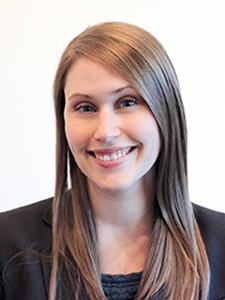Austin Oder Rosner Ph.D., Human Sciences with emphasis in Communication Disorders, 2016
Postdoctoral Research Fellow, Mother Infant Research Institute, Tufts Medical Center, Boston, Massachussetts
Austin Oder Rosner’s journey to earning her doctorate at the University of Nebraska-Lincoln began in a somewhat unlikely place – a neuroscience course she took as a first-year graduate student at the University of Kansas.
But it was in that course taught by Steven Barlow, now the Corwin Moore Professor in the Department of Special Education and Communication Disorders (SECD) at Nebraska, where she learned about the developing brain and the effects of preterm birth on normal developmental processes.
“I saw the immense potential for helping this fragile population, and Dr. Barlow’s groundbreaking research was doing just that,” Rosner said. “I immediately wanted to get involved in the exciting work in his lab.”
That she did. Rosner became a graduate research assistant in Barlow’s Communication Neuroscience Laboratories at KU. When he moved to Lincoln to join the faculty at Nebraska, his lab, and Rosner, moved too. After starting her doctoral studies at Kansas, Rosner quickly found herself at home at Nebraska when she arrived in January 2014.
“The transition was seamless,” Rosner said. “I was immediately invited to get involved in departmental activities, such as meeting with interviewing faculty and presenting at the Brown Bag seminars. The faculty, staff and students were so friendly and helpful that we felt at home in no time.”
While at Nebraska, Rosner completed her doctoral training and gained valuable experiences making research presentations alongside Barlow at various conventions, including the American Speech-Language Hearing Association (ASHA) annual convention and the annual meeting for the Society for Neuroscience.
“Although I only completed half of my doctoral work at Nebraska, the time I spent there was invaluable,” Rosner said. “I was able to conduct my dissertation research while at Nebraska thanks to the numerous resources provided by the department, including many of the SECD students participating in my projects. The resources and experiences provided to me during my time in SECD really helped lay the foundation for my future as a scientist.”
Since graduating in May 2016, Rosner can now be found at Tufts Medical Center in Boston. She continues to work with Barlow as a postdoctoral research fellow and study coordinator for his multi-center randomized control trial examining the effects of his NTrainer therapy device on sucking and feeding skills of extremely preterm infants in the neonatal intensive care unit. Rosner spends time in the NICU every day providing pulsatile oral stimulation to babies born between 24-27 weeks using the NTrainer.
She also works in the lab of Dr. Jill Maron, a neonatologist and the director of the Mother Infant Research Institute at Tufts. Rosner performs bench work extracting RNA from saliva samples collected from the same preterm infants, which will be used to examine genetic biomarkers indicative of oral feeding maturity. The overall research project, headed by Barlow and funded by a $2.8 million grant from the Eunice Kennedy Shriver National Institute of Child Health and Human Development of the National Institutes of Health, aims to improve oral feeding skills while also providing a better understanding of the genetics related to oral feeding.
After her postdoctoral fellowship is finished, Rosner hopes to combine the knowledge and skills from all of her education and training to continue contributing innovative research on early assessment and intervention with pediatric populations in an effort to enhance long-term developmental outcomes for those individuals.
“The neurophysiological and genetic components of brain development and oral motor control are extremely complex, and we need to understand how these mechanisms function in health and disease/disorder in order to develop and implement effective assessment techniques and therapeutic strategies.”
From those first classes that introduced her to Barlow more than seven years ago to her continued work with him on his NICU research today, Rosner values his mentorship and is quick to credit him for helping her get to where she is while also inspiring her future work.
“Throughout the years I spent working with Dr. Barlow both at KU and Nebraska, he provided me with support, encouragement, mentorship and friendship. He has continually inspired me to work hard, be confident in my abilities, think outside the box, and continue to move the field forward. His mentoring style has fostered immense personal and professional growth and independence, for which I will be forever grateful.”
